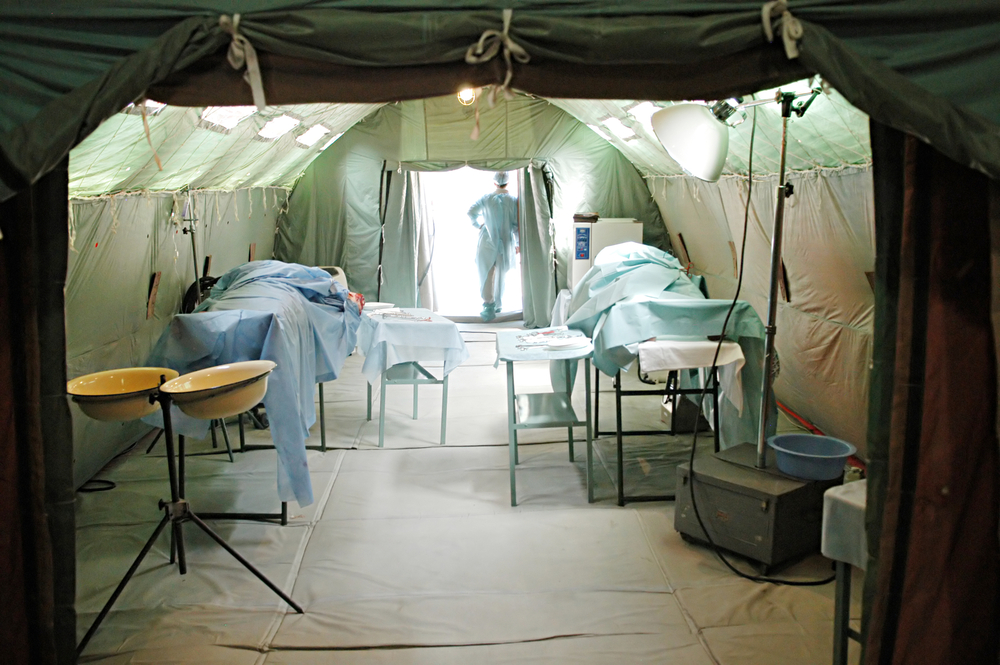The Pentagon’s Defense Innovation Unit (DIU) is looking to the private sector for portable ultrasound solutions to diagnose injuries on the battlefield following the Defense Advanced Research Agency‘s (DARPA’s) announcement of its similar Point of Care Ultrasound Automated Interpretation (POCUS AI) research program two months prior.
The Pentagon is running simultaneous research and innovation programs through DARPA and the DIU to bring portable ultrasound capabilities to its warfighting teams.
This week, the DIU opened a solicitation for the private sector to provide commercial, field-portable ultrasound solutions that can diagnose trauma and musculoskeletal injuries in austere environments.
“Before prototyping, devices must have FDA clearance/approval for the military’s intended use” — Defense Innovation Unit
“A successful prototype will be handheld, reliable, easily transportable, and have minimal power requirements,” reads the DIU open solicitation.
“It will withstand normal Army field environmental conditions and have multi-frequency capability to provide imaging quality sufficient for diagnosis. In the far forward environment, it is important for medical tools to be as simple, safe, and effective as possible.”
And before prototyping, the “devices must have FDA clearance/approval for the military’s intended use.”
.@DIU_x is looking for commercial, field-portable #ultrasound solutions. The solution will be used to diagnose trauma and musculoskeletal injuries in austere environments. The tech will allow diagnosis & triage closer to the point of injury. https://t.co/PXMEVaHmUz #healthcare
— DefenseInnovationUnit (@DIU_x) March 31, 2021
While the Pentagon is aiming to have medical personnel use the ultrasound devices in mobile tents, these portable facilities are not conducive for climate control or for providing a lot of power.
Therefore, the DIU is looking for prototypes that don’t use a lot of power and can withstand a wide range of environmental factors, including the ability to function after exposure to:
- Humidity
- Rain
- Solar radiation
- Sand/dust
- Vibration
- Accelerative forces and shock
- Acoustic noise
- Temperature extremes (freeze-thaw cycles and temperature shock) while maintaining full functionality
- Extended shelf life of at least three years at room temperature
- Non-climate controlled transit or storage
On the size, weight, and power factors, the DIU is looking for prototypes that must meet the following requirements:
- Have relatively small cube space in comparison to laptop-based devices
- Be lightweight and easily portable
- Have an adequate power source or battery options for prolonged field operations; the government is willing to review separate solution briefs from companies with innovative power solutions.
- Minimize logistical requirements in austere conditions
The DIU solicitation is open to the commercial sector until April 12, 2021, and you can check out all the specifics not mentioned in this article on the DIU website between now and the closing date.
“A successful prototype will be handheld, reliable, easily transportable, and have minimal power requirements” — Defense Innovation Unit
While the DIU is looking to innovate quickly on the field-portable ultrasound prototypes, DARPA is dedicating an entire research program to develop an AI prototype that can better make sense and use of point of care ultrasound data.
Point of care ultrasound devices are already on the market, but DARPA argues that current devices are too expensive and fall short on interpreting key datasets.
The challenge, according to DARPA, is that the few AI tools that have been developed to date have required “hundreds of POCUS patient datasets to be collected and manually annotated by expert clinicians for each medical condition.”
Therefore, the POCUS AI program “will address this challenge through advances in AI techniques that use limited training data and incorporate prior knowledge, including ultrasound domain expertise, to enhance utilization of POCUS in austere environments.”
So, the idea is to develop algorithms that can assist highly-trained medical professionals in carrying-out accurate diagnostic and intervention procedures for certain injuries while taking data from patient histories and known medical conditions into account.
DARPA wants AI to improve portable ultrasound devices for direct use on the battlefield
Pentagon seeks wearable & handheld tech for soldiers to control multiple unmanned vehicles









